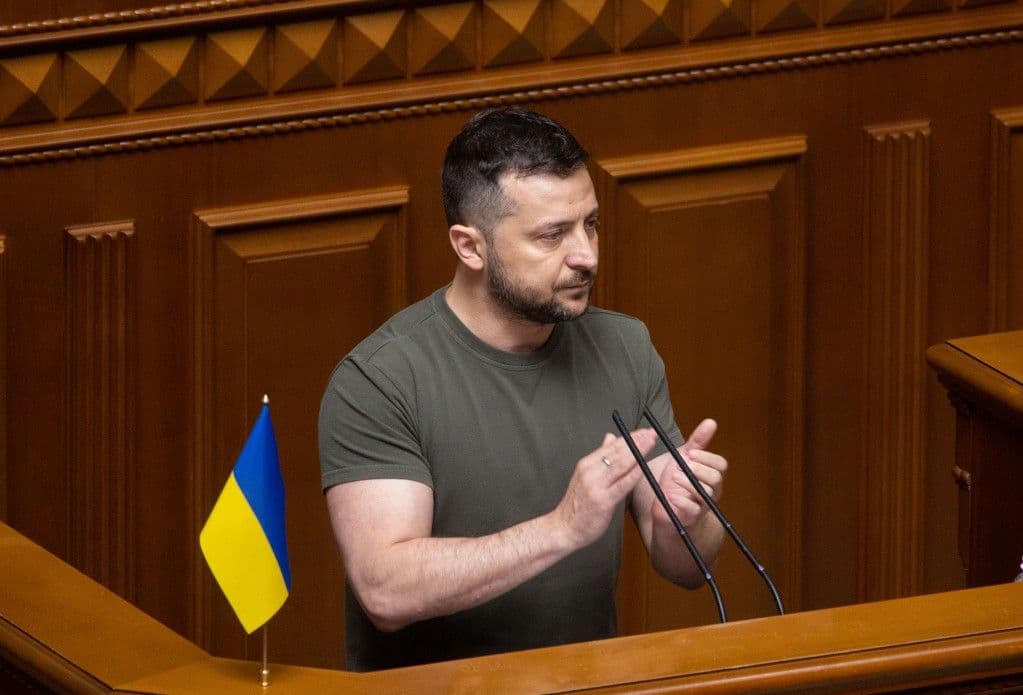Zelensky presents resilience plan: 'Ukraine may need to outlive someone in Moscow to achieve all the goals'

President Volodymyr Zelensky at parliament in July 2022. (Presidential Office)
President Volodymyr Zelensky unveiled Ukraine's 10-point plan for internal resilience in an address to the parliament on Nov. 19.
"Ukraine may need to outlive someone in Moscow to achieve all the goals," Zelensky said, according to lawmaker Yaroslav Zhelezniak's Telegram channel. "We do not trade security or sovereignty. We will not give up our rights to our entire territory."
The resilience plan follows some criticism Zelensky received after presenting a victory plan this fall that primarily focused on requests from external partners and lacked domestic reforms.
"While the whole world is waiting for a miracle from Trump, God willing, we should get to work," Zelensky said.
"Ukraine may need to outlive someone in Moscow to achieve all the goals," Zelensky said.
The individual points of the new resilience plan were focused on the country's unity, front-line situation, arms, finances, energy, security, communities, human capital, cultural sovereignty, and veterans, according to Zhelezniak's Telegram channel.
In his presentation to parliament, Zelensky emphasized he is not preparing to lower the mobilization age. Instead, he called for new approaches to management, establishing a military ombudsman, and creating a new contract system for citizens below the age of mobilization. With Ukraine facing sharp manpower shortages, Zelensky has come under pressure both from citizens at home and from U.S. lawmakers abroad to reduce the age of mobilization.

Zelensky also said that Ukraine will produce at least 30,000 long-range drones next year, and noted that Ukraine has already struck targets using their domestically-produced Neptune cruise missiles. In his speech, he set a goal of producing 3,000 cruise missiles.
For veterans, Zelensky proposed new efforts to recruit veterans for public service, creating rehabilitation centers in every community in 2025, introducing 11,000 veteran support specialists in the next year, providing supplementary payments to family physicians treating veterans, and establishing dedicated veteran housing.
Financial aspects of the plan included deregulation, insuring military risks, and increased security for businesses from law enforcement pressures.
The individual points are "generally correct," said Yaroslav Yurchyshyn, who heads Committee on Freedom of Speech in parliament. "But the biggest problem is the financial resources to implement the points of the plan."
One example he cited was Zelensky's promise to offer free breakfasts to all children and schools, while Ukraine is "looking around the world for money for defense."
"Can we do it? It's a question," he said, noting that not every parent needs assistance for meals. "How calculated and realistic is it? There are many such examples."

Overall, Yurchyshyn said he hoped this speech – and other recent events like last week's interview Zelensky held with a Ukrainian radio station – signaled a shift towards more transparent and more frequent communication from the government to its people.
"Until now, the authorities have preferred therapeutic, soothing communication through convenient channels, such as the Telemarathon," said Yurchyshyn. "The society has earned and demonstrates every day that it is ready for mature communication about the real situation, both at the front and the challenges throughout the country."
Oleksandr Merezhko, the chair of the parliament's foreign affairs policy, described the plan as “quite realistic,” and added: “It’s also crucially important that the President had emphasized that we are not going to cede our territories."
The speech was an important signal that Ukraine would "never" agree to a "peace for territory" plan as proposed by some foreign partners, he noted.
"We will not give up our rights to our entire territory," Zelensky said.
Merezhko said he saw the plan as general guidelines for how Ukraine can survive the war domestically, as well as a motivational plan to boost morale at home “and show our partners in the West that we are determined to survive and win no matter what.”
Other reported aspects of the plan include filling empty diplomatic posts by the end of the year, modernizing shelter standards, prioritizing atomic generation, strengthening the state border, and allowing dual-citizenship for Ukrainians.
Zelensky also proposed a cultural "Ramstein" to reinforce and export Ukraine culture abroad, including helping to establish Ukrainian studies departments in foreign universities.
Lawmaker Zhelezniak critized the thoroughness plan, writing on Telegram: "Overall it is very confused and looked/sounded like most of the plan wasn't ready at all. Except for the last point (about veterans), most are just fluff."

Responding to the plan's anti-corruption elements, Anastasia Radina, chairwoman of the anti-corruption committee told the Kyiv Independent in a statement: "The President announced a series of legislative initiatives aimed at enhancing the fight against corruption. The parliamentary anti-corruption committee stands prepared to thoroughly examine and advance the proposals submitted by the Head of State."
The committee is continuing to focus on meeting the needs of Ukraine's and international partners' needs, Radina added, including strengthening judicial accountability for those suspected or accused of corruption, reducing corruption in procurement, and introducing criminal liability for corrupt medical officials involved in mobilization enrichment schemes.
In regards to unity, Zelensky reportedly restated that the country will not hold any elections until martial law is lifted, and said that further aspects of the plan will be developed in detail in coordination with civil society members, business leaders, and experts.












